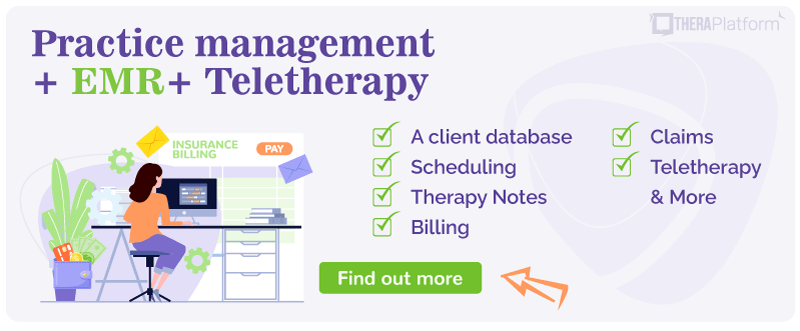CMS proposed rule for 2025

The CMS Proposed Rule 2025 including an update to the conversion factor is something many healthcare providers are keeping a close watch as it relates to changes to reimbursement policies from the Centers for Medicare & Medicaid Services (CMS). These changes would directly impact therapists.
→ Click here to enroll in our free on-demand Insurance Billing for Therapists video course [Enroll Now]
The CMS Proposed Rule 2025 includes ways that CMS plans to adjust Medicare and Medicaid payments, particularly for therapy services. One of the key changes is an update to the conversion factor.
The conversion factor is a key driver of reimbursement rates. It is a multiplier that can determine the final payment amount for a service billed to Medicaid or Medicare. This occurs when the conversion factor is applied to a procedure’s relative value unit (RVU).
Why should therapists pay attention to changes in the conversion factor (CF)? Even small changes to the CF can substantially impact a therapy practice’s financial viability if Medicare and Medicaid are accepted. A thorough understanding of changes included in the CMS proposed rule 2025 can help practice owners make informed financial decisions.

CMS Proposed Rule 2025 key changes
The most significant change included in the CMS Proposed Rule 2025 is a decrease in the conversion factor. The reduction proposed by CMS would affect the amount that providers are reimbursed for services under Medicare and Medicaid.
The conversion factor has fluctuated several times in the past. There have been both increases and decreases as a result of legislative decisions and budgetary needs.
The conversion factor was set at $33.89 in 2024, which reflects a slight increase from 2023. CMS is proposing a decrease of the conversion factor in 2025 to approximately $32.75. This reduction of approximately 3.4% could significantly impact the financial stability of healthcare practices of all sizes.
Providers of therapy services (including occupational, physical, speech, and mental health therapy) could be reimbursed at lower rates following the CMS proposed rule 2025. The exact implications to each type of therapy service are difficult to predict, however there may be more challenges faced by therapists when it comes to maintaining their current level of service provision.
Watch this video to learn common insurance billing struggles and solutions
→ Start My Free Trial
→ Start My Free Trial
CMS proposed rule 2025 financial implications for therapists
A reduction in the conversion factor would lead to lower payments for services (including therapy services) that are covered by Medicare or Medicaid. Even a reduction of a few dollars could result in significantly decreases in the reimbursement rates for individual therapy, group sessions, and evaluations.
This decrease would significantly impact both private practices and large organizations.
The level of impact depends on factors such as:
- The number of Medicare or Medicaid clients
- Overall volume of clients
- The specific type of therapy services provided
Private practice owners, including solo practitioners are likely to face significant financial pressure as a result of the proposed reduction in the conversion factor. Smaller practices may be more vulnerable to financial challenges because they may operate on thin margins and have fewer streams of revenue.
Larger healthcare organizations, in contrast, often have additional resources that can help them absorb the financial effects of the conversion factor reduction. However, even larger healthcare organizations may experience financial challenges due to changes in the conversion factor.
With these changes may come a need for organizations to make financial adjustments or engage in strategic planning. This could include a re-evaluation of billing practices, adjustments to service delivery models, or finding new ways to optimize efficiency.
→ Download My Free Insurance Billing Guide
Advocacy and industry response reaction from professional associations
The CMS Proposed Rule 2025 has received significant attention from several key professional associations for therapists. Associations such as the AOTA (American Occupational Therapy Association), APTA (American Physical Therapy Association), ASHA (American Speech-Language-Hearing Association), and various mental health organizations have expressed concerns about the potential financial impact that the conversion factor reduction could have on therapy providers. These organizations have also highlighted potentially positive impacts to therapy services.
AOTA (American Occupational Therapy Association)
AOTA states that the proposed decrease to the conversion could reduce reimbursement for OT services, which has already seen significant cuts compared to other health providers.
However, AOTA advocated for several positive changes, which are expected to be included in the 2025 proposed rule:
- Addition of CPT codes 97550, 97551, and 97552 to the Medicare Telehealth Services List with provisional status.
- Adoption of practice expense values recommended by the AMA.
- Approval of general supervision of OTAs and PTAs when furnishing outpatient therapy services in private practice under supervision of Medicare-enrolled OTs and PTs, respectively.
- Establishment of new coding and payment for caregiver training (without the patient present).
ASHA (American Speech Language Hearing Association)
ASHA too has expressed concerns regarding a payment cut, which is estimated as 2.8% but could be as high as 9%.
CMS does not propose to add audiology and speech language pathology services to the permanent telehealth services list, despite that this has been shown to be an effective delivery model.
Potential positive impacts to this field include updates to the therapy plan of care certification requirements, which could reduce the administrative burden faced by SLPs. A policy on caregiver training services (CTS) could also be updated to allow SLPs to obtain a patient’s verbal consent.
Ongoing advocacy efforts
Therapists can take steps to advocate for fair reimbursement rates. Therapists are encouraged to join advocacy efforts made by their professional associations, encouraging CMS to reconsider the proposed decrease to the conversion factor.
Therapists can also stay informed about the proposed rule and advocate by reaching out to their elected representatives and submitting public comments.
Start 30-day Free Trial and explore TheraPlatform. HIPAA Compliant Video and Practice Management Software for Therapists.
Next steps for therapists
Implementation occurs on January 1, 2025 and therapists can monitor the CMS website closely for updates on the 2025 proposed rule and changes to the conversion factor.
Professional association websites (such as ASHA, AOTA, APTA, and mental health professional organizations) typically provide updates, guidance, and advocacy tools.
To prepare for potential changes in reimbursement, therapists can evaluate current billing practices, consider adjusting fee schedules, and explore other revenue streams. Those who work in private practice might consider reassessing financial strategies, renegotiating contracts, or seek additional funding sources.
CMS Proposed Rule 2025 recap
The CMS proposed rule 2025, including changes to the conversion factor, includes a significant shift in Medicare reimbursement rates. This could potentially lead to a reduction in payments for services and financial challenges for both private practices and larger healthcare organizations.
It’s important for therapists to stay informed, be prepared for potential changes to their business models, and advocate for fair reimbursement rates.
How EHR and practice management software can save you time with insurance billing for therapists
EHRs with integrated billing software and clearing houses, such as TheraPlatform, offer therapists significant advantages in creating an efficient insurance billing process. The key is minimizing the amount of time dedicated to developing, sending, and tracking medical claims through features such as automation and batching.
What are automation and batching?
- Automation refers to setting up software to perform tasks with limited human interaction.
- Batching or performing administrative tasks in blocks of time at once allows you to perform a task from a single entry point with less clicking.
Which billing and medical claim tasks can be automated and batched through billing software?
- Invoices: Create multiple invoices for multiple clients with a click or two of a button or set up auto-invoice creation, and the software will automatically create invoices for you at the preferred time. You can even have the system automatically send invoices to your clients.
- Credit card processing: Charge multiple clients with a click of a button or set up auto credit card billing, and the billing software will automatically charge the card (easier than swiping!).
- Email payment reminders: Never manually send another reminder email for payment again, or skip this altogether by enabling auto credit card charges.
- Automated claim creation and submission: Batch multiple claims with one button click or turn auto claim creation and submission on.
- Live claim validation: The system reviews each claim to catch any human errors before submission, saving you time and reducing rejected claims.
- Automated payment posting: Streamline posting procedures for paid medical claims with ERA. When insurance offers ERA, all their payments will post automatically on TheraPlatform's EHR.
- Tracking: Track payment and profits, including aging invoices, overdue invoices, transactions, billed services, service providers.
Utilizing billing software integrated with an EHR and practice management software can make storing and sharing billing and insurance easy and save providers time when it comes to insurance billing for therapists.

Resources
TheraPlatform is an all-in-one EHR, practice management, and teletherapy software built for therapists to help them save time on admin tasks. It offers a 30-day risk-free trial with no credit card required and supports mental and behavioral health, SLPs, OTs, and PTs in group and solo practices.
- CMS Proposed Rule for 2025
- AOTA’s Position on CMS Proposed Rule
- ASHA’s Response to CMS Rules
- APTA Advocacy
- Revenue Cycle Management (RCM) Tools
- Therapy-specific RCM software (such as TheraPlatform) that can help streamline billing, track reimbursement, and ensure for maximum revenue for each service provided
- Certified Financial Planners (CFP)
More resources
- Therapy resources and worksheets
- Therapy private practice courses
- Ultimate teletherapy ebook
- The Ultimate Insurance Billing Guide for Therapists
- The Ultimate Guide to Starting a Private Therapy Practice
- Insurance billing 101
- Practice management tools
Free video classes
- Free on-demand insurance billing for therapist course
- Free mini video lessons to enhance your private practice
- 9 Admin tasks to automate in your private practice
References
Burks, K., Shields, J., Evans, J., Plumley, J., Gerlach, J., & Flesher, S. (2022). A systematic review of outpatient billing practices. SAGE Open Medicine, 10, 20503121221099021. DOI: https://doi.org/10.1177/20503121221099021 .
Knickman, J. R., Marchica, J., & Radley, D. C. (2023). Health Care Financing, Costs, and Value. Jonas and Kovner's Health Care Delivery in the United States, 34.
McCullough, A. (2001). Viability and effectiveness of teletherapy for pre‐school children with special needs. International journal of language & communication disorders, 36(S1), 321-326. DOI: https://onlinelibrary.wiley.com/doi/abs/10.3109/13682820109177905?casa_token=rdIfqd_j72sAAAAA:8YK9WZt2GzSFNEuC0mR5RXxw_VoAnMbVIB-3kKp5P7S9GGg5FDO6YtRzKPV-Qm91OunGIJn_MhAYF-JL



